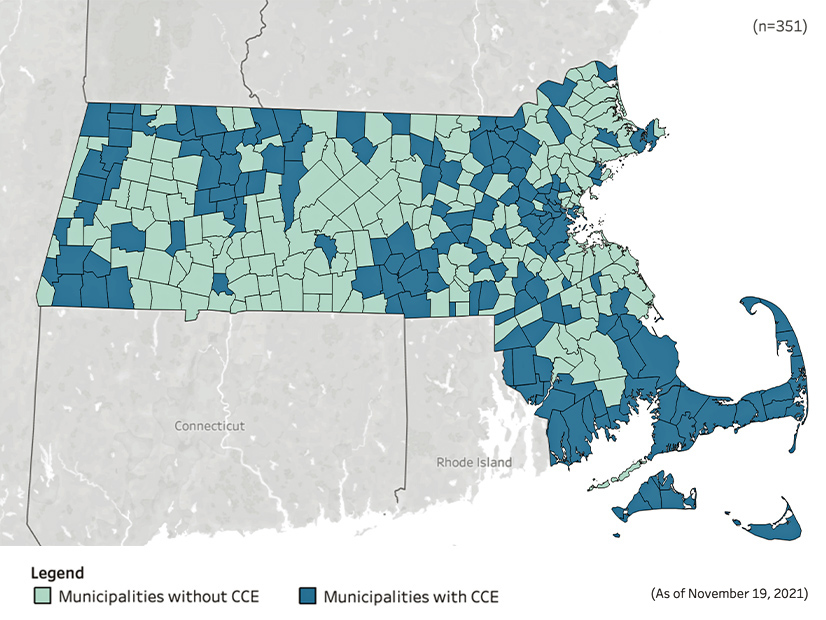
A newly published study finds that community choice energy aggregation programs have resulted in cost savings for residents in 79% of the Massachusetts municipalities that have developed them.
The report, released Monday by the University of Massachusetts Amherst, also found that community choice energy (CCE) programs in the state are contributing to sustainability goals: Some 60% of the default CCE packages analyzed have a higher percentage of renewable energy certificates (RECs) than required by the Massachusetts Renewable Energy Portfolio Standard, and almost a third were 100% RECs.
In a news release, Marta Vicarelli, an assistant professor of economics and public policy at UMass Amherst and principal investigator in the study, said the results suggest that CCE programs stabilize prices, increase consumer protection and support the transition to sustainable energy.
Also, she said, “by expanding local renewable energy markets, CCE programs contribute to local economic development.”
The study compared CCE package prices with the local utility’s monthly residential basic service rates and found the CCE prices were lower in 79% of the municipalities. Savings ranged as high as 2.55 cents/kWh and averaged 0.88 cents/kWh. The data ran only through October 2021 and so do not reflect any higher level of savings created by recent price volatility.
For municipalities with a percentage of RECs higher than state requirements, the numbers were slightly different: More localities (89%) achieved savings, but the average amount saved was lower (0.84 cents/kWh).
The study also branched into the more subjective aspects of CCE, such as community attitudes toward sustainability, and it went beyond market data to include focus groups, an online survey and interviews with local leaders about their experiences implementing the programs.
“To our knowledge, this is the first study assessing in detail the performance of a CCE program in the United States by both analyzing market data as well as the self-reported experience of municipalities,” Vicarelli said.
In November 2021, when the UMass Amherst Sustainable Policy Lab collected the market data for its study, 157 of the 351 municipalities in the state had adopted CCE programs; 97 of them responded to the online survey that was part of the study.
Among the findings:
- Money was the driving factor most often: 56% of municipal officials surveyed said rate reduction was the primary goal for the local CCE program, compared with increased use of renewable energy (27%) and price stability (16%).
- Motive often aligned with politics: 32% of municipalities that swung Democratic in the last two presidential elections cited higher renewable energy as their primary goal, compared with only 6% of those that swung Republican.
- The roadblock most often reported (26%) in implementing a CCE program was the slow process of approval by the state Department of Public Utilities — more than a year in some cases.
- Smaller municipalities, which typically have fewer resources, often had trouble setting up their CCE programs (43%), with the most common complaint being difficulty understanding state regulations.
- Once a CCE program was in place, administrative costs were not cited as a problem by any officials surveyed.
Under state rules, residents who do not opt out are automatically enrolled in the default package in their municipality’s CCE program when it is put in operation. They can opt to switch to packages with different percentages of RECs and different prices, if they are available, or they can also opt out.
Almost a quarter of Massachusetts municipalities surveyed said the automatic opt-in created resentment among their residents.
As of early 2023, 176 municipalities have obtained DPU approval to run CCE programs, the largest of which is Boston. The city is currently posting a standard rate (32% renewable energy) of 11.29 cents/kWh, with an opt-down option (22% renewable energy) of 10.9 cents and an opt-up option (100% renewable energy) of 13.987 cents. Prices run through December 2023.
Boston Community Choice Electricity indicates the basic Eversource Energy residential rate (22% renewable energy) is 25.776 cents through June 2023. Sixty-one percent of residential customers were in municipal aggregation in 2021, the last year for which statistics are available in the DPU repository.



